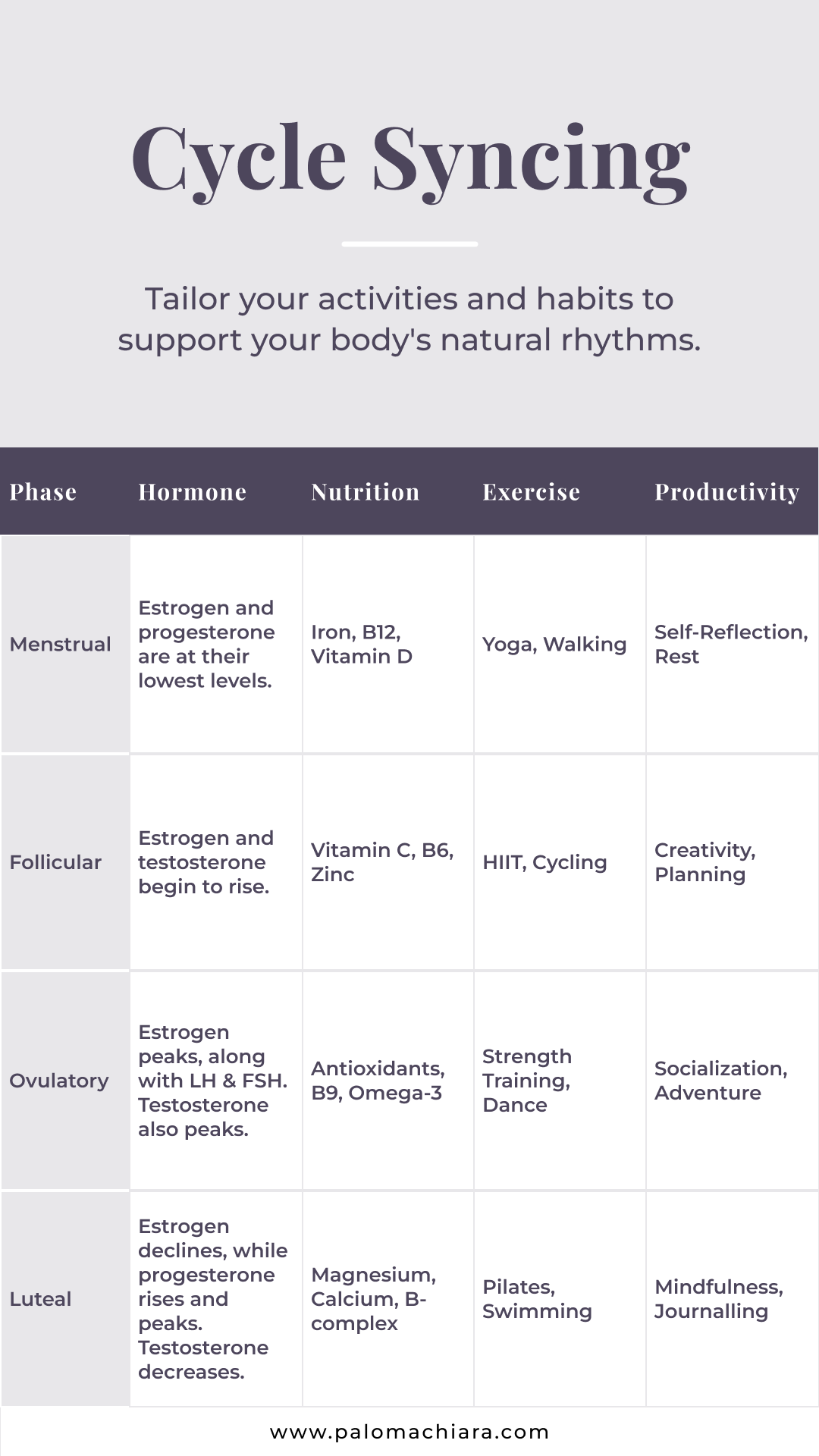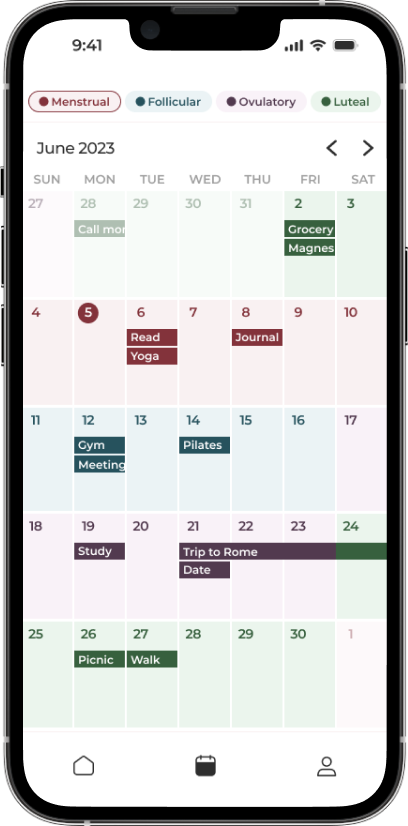What Does It Mean To Sync Your Life to Your Menstrual Cycle?

From nutrition to exercise, sleep, and even productivity, tailoring activities to the different phases of the menstrual cycle can lead to improved overall well-being. Let’s delve deeper into what this entails and how it can potentially benefit people who menstruate.
The Roots of Syncing to Your Menstrual Cycle
Syncing your life to your menstrual cycle, in essence, is not a novel concept. Throughout history, various cultures have recognized the significance of women’s menstrual cycles and their impact on overall well-being.
Traditional medical systems like Ayurveda and Traditional Chinese Medicine (TCM) also incorporated menstrual cycle awareness into their frameworks. Ayurveda, originating in ancient India, emphasizes the importance of balancing doshas (vata, pitta, kapha) to maintain health. Menstrual cycles were seen as reflective of these doshic imbalances, guiding lifestyle and dietary recommendations to restore harmony.
Similarly, TCM views the menstrual cycle as a reflection of the body’s yin and yang energies. Imbalances in these energies were believed to manifest as menstrual irregularities or discomfort. Acupuncture, herbal medicine, and dietary adjustments were utilized to support menstrual health and restore equilibrium.
Harmonizing Life with the Menstrual Cycle, from Tradition to Mainstream
While traditional practices laid the foundation for understanding the menstrual cycle’s significance, it wasn’t until recent decades that syncing one’s life to their menstrual cycle gained mainstream attention. The resurgence of interest in holistic health and wellness, coupled with advancements in scientific research, propelled syncing your life to your cycle into the spotlight.
In the 1990s, Dr. Christiane Northrup, a prominent women’s health advocate, brought attention to the concept of “Women’s Bodies, Women’s Wisdom,” emphasizing the importance of understanding and honoring the female body’s natural rhythms. Her work helped popularize the idea of aligning lifestyle choices with the menstrual cycle for optimal health.
Influencers, health coaches, and wellness experts advocate for tailoring diet, exercise, self-care practices, and even work schedules to align with the menstrual cycle’s phases. Mobile apps and digital platforms offer menstrual tracking tools and resources, making it easier for women to incorporate cycle-aware practices into their daily lives.
Understanding the Menstrual Cycle
The menstrual cycle is the monthly hormonal cycle experienced by women of reproductive age, typically lasting between 28 to 32 days, although variations are common. It consists of four phases: menstruation, the follicular phase, ovulation, and the luteal phase. Each phase is characterized by fluctuations in hormone levels, which play a crucial role in reproductive health and overall physiology.
The Principles of Syncing Your Life to Your Menstrual Cycle
Syncing your life to your cycle is based on the premise that the female body undergoes distinct changes throughout the menstrual cycle, and aligning various activities with these changes can optimize health and well-being. While individual experiences may vary, syncing to your cycle generally involves adjusting diet, exercise, self-care practices, and productivity strategies according to the specific needs of each menstrual phase.
Syncing to Your Menstrual Cycle: Phases and Recommendations
Menstruation (Days 1-7)
During menstruation, estrogen and progesterone levels are at their lowest. This phase is often characterized by fatigue, cramps, and mood fluctuations.
Recommendations:
- Focus on rest and gentle movement, such as yoga or walking.
- Incorporate iron-rich foods like leafy greens, legumes, and lean meats to replenish lost nutrients.
- Prioritize self-care activities like warm baths, meditation, or journaling to nurture emotional well-being.
Follicular Phase (Days 7-14)
Estrogen levels gradually rise during the follicular phase, leading to increased energy and a sense of vitality.
Recommendations:
- Engage in moderate to high-intensity workouts, as energy levels are typically higher.
- Include a variety of nutrient-dense foods to support overall health.
- Take on mentally stimulating tasks and creative projects, leveraging increased cognitive function.
Ovulatory Phase (Day 14-21)
Ovulation occurs when the ovary releases an egg, typically around day 14 of the menstrual cycle. Estrogen peaks during this phase, promoting feelings of confidence and sociability.
Recommendations:
- Enjoy activities that foster connection and social interaction, such as spending time with friends or participating in group workouts.
- Embrace adventurous or spontaneous endeavors, harnessing the surge in confidence and energy.
- Prioritize foods rich in antioxidants and omega-3 fatty acids to support hormonal balance.
Luteal Phase (Days 21-28)
Progesterone levels rise during the luteal phase, which can lead to symptoms such as bloating, cravings, and mood swings.
Recommendations:
- Opt for gentle exercise routines like Pilates or cycling to support relaxation and reduce stress.
- Incorporate complex carbohydrates, healthy fats, and protein to help stabilize blood sugar levels and alleviate cravings.
- Practice mindfulness techniques or engage in calming activities like gentle stretching or reading before bedtime to promote quality sleep.

Benefits of Syncing to Your Menstrual Cycle
- Hormonal Balance: By aligning activities with the natural fluctuations of the menstrual cycle, it aims to promote hormonal balance, potentially reducing symptoms of PMS and menstrual irregularities.
- Improved Energy and Productivity: Tailoring tasks and responsibilities to suit different menstrual phases can help women capitalize on periods of heightened energy and focus while allowing for rest and rejuvenation during times of lower energy.
- Enhanced Well-being: Prioritizing self-care practices and nurturing activities throughout the menstrual cycle can contribute to overall well-being, fostering a deeper connection with one’s body and its natural rhythms.
Can You Sync to Your Menstrual Cycle While on Birth Control?
While synchronizing one’s life with their menstrual cycle can be beneficial for many women, there are certain groups for whom it may not be applicable. Individuals using hormonal contraceptives, such as birth control pills, patches, or hormonal IUDs, may experience artificially regulated hormone levels, disrupting the natural ebb and flow of the menstrual cycle. It’s important to note that non-hormonal contraceptives, such as condoms or copper IUDs, may have less impact on hormonal fluctuations and could potentially be compatible with syncing one’s life to their cycle, although individual experiences may vary.
Additionally, women who have entered menopause, characterized by the cessation of menstrual cycles, may find that the fluctuation of hormonal levels no longer follows a predictable pattern. Therefore, trying to sync your life to your cycle may not be suitable during this phase.
Ultimately, those navigating menopause or utilizing hormonal contraceptives should consult with healthcare professionals to determine the most appropriate wellness strategies for their unique circumstances.
Hire me as your life coach Let's start

The App Made To Sync Your Lifestyle to Your Menstrual Cycle.
A solution for women who are looking to keep track of what they sync to their cycles, such as fitness, diet, etc. by adding it to a calendar that also predict their phases.
Learn moreRecent posts
-
50 “I Am” Morning Affirmations To Start Your Day With Positivity
Read blog -
The Complete Guide to Mood Trackers (I Tracked My Mood Daily for 2 Years)
Read blog -
50 Affirmations for Self-Love
Read blog -
50 Positive Affirmations for Women
Read blog -
Healing Abandonment Wounds Through Emotional Permanence
Read blog -
Three Neuroscience-Backed Hacks That Can Change Your Life
Read blog



Comment